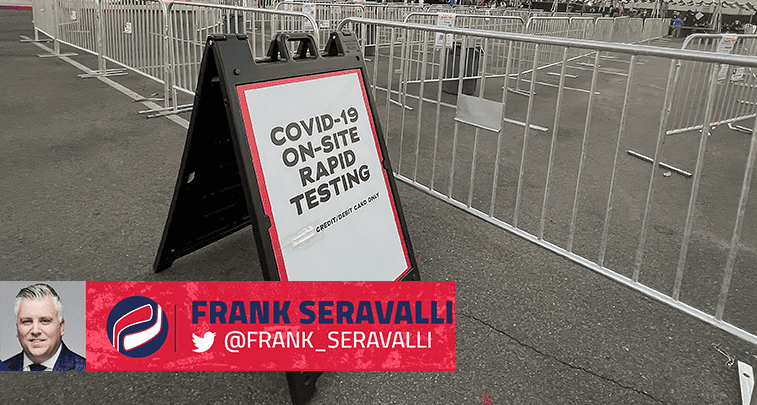NHL relaxes roster, cap rules in attempt to battle Omicron surge

After postponing an additional 14 games scheduled for Dec. 27, the NHL relaxed roster and salary cap constraints on Sunday in an attempt to get the league back on the ice – and keep it playing – while the Omicron variant wreaks havoc on operations.
NHL players returned to team practice facilities on Sunday for the first time since Dec. 21, when the league began an extended holiday break to combat COVID-19. That meant many players were tested for COVID-19 for the first time since before the holidays.
At least 44 new players entered the league’s COVID-19 protocol according to data tracked by Daily Faceoff, including players from four teams (Anaheim, Dallas, Pittsburgh and Tampa Bay) that did not have any players reported in active protocol prior to the holidays.
Sources say more players are expected to be added to the protocol on Monday once officially confirmed positive. Some teams are waiting on results before embarking on travel for games on Tuesday that could yet be postponed.
A total of 64 games have been postponed this season, including 59 over the last two weeks.
Winter Classic host Minnesota Wild are now the NHL’s only team without an active COVID-19 infection; the Wild do not play again until their primetime outdoor clash at Target Field on New Year’s Day with the visiting St. Louis Blues. The Blues added four players to the COVID-19 protocol on Sunday, bringing their active total to five, including Oskar Sundqvist, who entered the protocol on Dec. 18.
Buffalo’s Don Granato was the sixth NHL head coach added to the protocol in the last two weeks. The Sabres reported Granato, who had a near-death brush with pneumonia in 2019, was thankfully asymptomatic on Sunday following his positive test.
While Sunday’s numbers were not unexpected given Omicron’s highly contagious spread and the lapse between tests, it highlighted the challenge on the NHL’s hands.
Unlike the NFL, the NHL cannot halt testing for asymptomatic players because of Canadian federal government and border reasons. It must adapt in other ways.
According to a memo distributed by the league on Sunday, obtained by Daily Faceoff, the adjustments were made to allow teams to “better manage roster disruptions being created COVID-19.”
Among the key changes: Optional taxi squads were temporarily reinstituted; teams will no longer be forced to play with short rosters due to salary cap constraints; extra goaltenders can be immediately recalled; and the maximum salary for players recalled on an emergency basis was increased to $1 million.
Taxi squads will dissolve after each team’s final game before the All-Star break begins on Feb. 2. A maximum of six players may be placed on a taxi squad. Teams were notified that the purpose of the taxi squad is to provide teams with “readily available players” in order to minimize teams playing short or postponed games – and not as “salary cap management tools.”
Last season, teams sent players back and forth to the taxi squad on off-days to accrue salary cap space. Waiver-exempt players on entry-level contracts such as Montreal’s Nick Suzuki and New York’s Kaapo Kakko were some of the players shuttled in paper transactions that helped bank space for their teams.
This time around, the NHL arranged taxi squad regulations in a way that essentially only allows AHL players, by only making players eligible who have skated in fewer than 25 percent of NHL games this season.
Additionally, goaltenders can be recalled from the taxi squad immediately if one of the team’s netminders is unable to play – which would effectively reduce the need for the ever-popular emergency backup goaltender (EBUG), at least while taxi squads are active.
Players on the taxi squad will be paid AHL salary with the addition of a $500 USD daily stipend.
The cost for nearly all of Sunday’s roster changes will be borne on the players. Emergency recalls, taxi squad stipends and benefits will all count toward the “Players’ Share” of the 50/50 revenue split with owners, according to the memo, which will ultimately add to the $1.1 billion debt owed to owners.